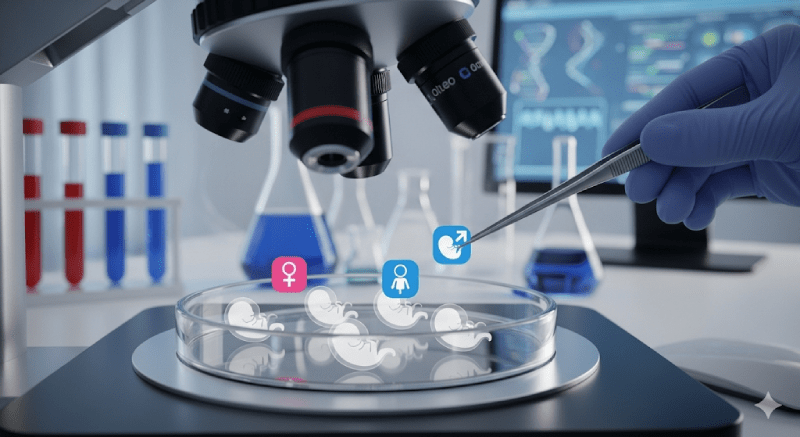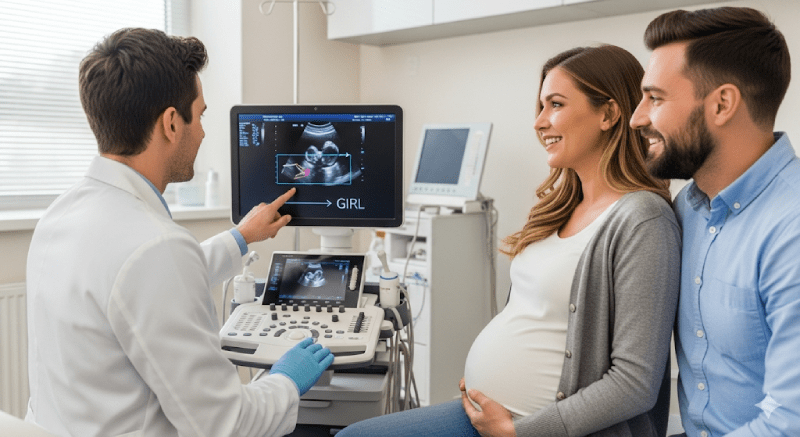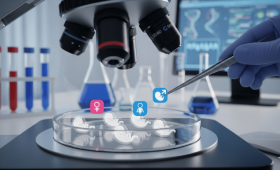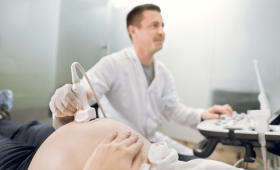How Does the IVF Treatment Process Begin?
The IVF treatment process begins with a detailed preliminary evaluation by a specialist doctor. In the first examination, the couple’s medical history, previous treatment attempts, and general health status are reviewed. Hormone tests, ultrasonography, and a hysterosalpingography (HSG) are requested from the female patient, while a sperm analysis is performed on the male patient. The data obtained at this stage enables the determination of the most suitable treatment protocol for the couple. This initial phase forms the basis of the treatment plan and plays a critical role in achieving success.
What Happens During the First Examination and Evaluation?
The first examination is conducted to get a comprehensive picture of the couple’s reproductive health. Blood tests for hormone levels (such as AMH, FSH, and E2) are performed to determine the female patient’s ovarian reserve. Ultrasonography is used to evaluate the condition of the uterus and ovaries. If not done previously, an HSG is used to check for open fallopian tubes and the uterine cavity’s structure. A sperm analysis is requested from the male patient to examine factors like sperm count, motility, and morphology. With Cure Holiday, this initial evaluation process is organized quickly and efficiently.
What Tests Are Mandatory for IVF Treatment?
Before starting IVF treatment, certain mandatory tests are required for both the male and female. The female patient is asked for blood tests showing hormone levels (FSH, LH, E2, Prolactin, TSH), a complete blood count, blood type, and infectious disease screenings (Hepatitis B, C, HIV, VDRL). The male patient undergoes a sperm analysis and infectious disease tests. Additionally, official documents proving that the couple is married are also legally mandatory. Cure Holiday simplifies the process by notifying you of all necessary documents and tests in advance.
What is the Ovarian Stimulation Phase?
The ovarian stimulation phase is a process where the woman’s ovaries are stimulated with the help of medications to obtain multiple eggs. This phase usually starts on the 2nd or 3rd day of the menstrual cycle and lasts approximately 10-12 days. The size and number of eggs are regularly monitored with ultrasound and blood tests. When it is determined that the eggs have reached the desired size, a trigger shot is administered, and the patient is ready for the egg retrieval procedure.
How Is the Egg Retrieval Procedure (OPU) Performed?
The egg retrieval procedure (OPU – Oocyte Pick-Up) is a painless procedure performed under light sedation approximately 34-36 hours after the trigger shot. A specialist doctor uses a fine needle with the guidance of a vaginal ultrasound to collect the mature eggs from the follicles in the ovaries. This procedure takes an average of 15-20 minutes. Patients are discharged after resting for a few hours. This operation is the first and most crucial step in embryo formation.
What Is the Sperm Collection Process Like?
The sperm collection process is carried out on the same day as the egg retrieval. The male patient is asked to provide a sperm sample through masturbation in a private room. If sperm cannot be obtained by this method or if the sperm count is insufficient, surgical methods (such as TESE, TESA) may be applied. The collected sperm sample is subjected to a special procedure in the laboratory to select the highest quality sperm.
How Is the Fertilization Process Performed?
Fertilization is the process of bringing the collected eggs and sperm together in a laboratory environment. Two main methods are used: conventional IVF and microinjection (ICSI). In the conventional method, eggs and sperm are placed in the same dish, and the sperm are expected to fertilize the eggs naturally. In microinjection, the healthiest sperm, selected under a microscope, is injected directly into each egg. This method offers high success rates, especially in cases of male infertility.
When and How Is Embryo Transfer Performed?
Embryo transfer is the process of placing embryos that have completed their development in the laboratory for 3 to 5 days, into the expectant mother’s uterus with the help of a special catheter. The transfer is usually performed when the embryos are at the 3rd-day (cleavage) or 5th-day (blastocyst) stage. Blastocyst transfer is often preferred in modern IVF centers as it offers higher pregnancy rates. The procedure does not require anesthesia and provides comfort to the patient.
What Should Be Done After Embryo Transfer?
Resting after embryo transfer is very important. Bed rest is generally recommended for half an hour to an hour. During this period, heavy exercise and physical activities should be avoided. The medication treatment should be continued regularly, and the doctor’s recommendations should be followed meticulously. Activities such as sexual intercourse and heavy lifting should also be avoided. Drinking plenty of water and eating healthily also helps increase the chances of the embryo implanting.
What Methods Are Used for Recurrent IVF Failures?
Recurrent IVF failures are a complex condition that requires a special examination. In such cases, PGT (Preimplantation Genetic Diagnosis) is used to examine the genetic structure of the embryos, and those without chromosomal abnormalities are selected. Additionally, methods such as hysteroscopy for detecting uterine problems, immunological treatments for uterine immune system issues, or embryo glue can be used as supplementary methods. Cure Holiday aims to increase the chances of success by offering the latest technological approaches in such cases.
What Factors Affect the Success Rate of IVF Treatment?
Many factors affect the success rate of IVF treatment. The most important factors include the woman’s age, ovarian reserve and quality, sperm quality, and previous treatment history. Additionally, the uterine structure, embryo quality, and the treatment protocol used also directly affect success. As age advances, egg quality decreases, so the success rate also decreases. Therefore, starting treatment at an early age is of great importance.
What Medications Are Used During Treatment?
The medications used during IVF treatment are vital for supporting egg development and keeping the treatment process under control. The most commonly used medications include gonadotropins (hormones that stimulate egg development), GnRH antagonists or agonists (that prevent premature ovulation), and hCG (the trigger shot). After treatment, supportive hormones like progesterone are used to maintain the pregnancy.
What Are the Side Effects of Egg Development Medications?
The side effects of egg development medications vary from person to person but are generally mild. The most common side effects include mild abdominal bloating, tenderness, headaches, fatigue, and slight redness at the injection site. In rare cases, Ovarian Hyperstimulation Syndrome (OHSS) can develop, but this condition can be easily managed with modern protocols. Cure Holiday‘s expert team provides information about possible side effects and ensures your follow-up throughout the entire process.
What is the ICSI (Microinjection) Method in IVF Treatment?
ICSI (Intracytoplasmic Sperm Injection) is a fertilization method in which a single sperm is injected directly into an egg. This method provides a great advantage, especially in cases of male infertility (low sperm count, motility, or morphology). It can also be preferred if fertilization failure occurred in previous IVF attempts or if frozen eggs are being used. This is one of the most important success-enhancing methods of IVF treatment.
When Is PGT (Preimplantation Genetic Diagnosis) Used?
PGT is the genetic examination of the embryo before it is transferred into the uterus. This method is used especially in cases such as advanced maternal age, recurrent miscarriages, recurrent IVF failures, or when one of the couples is a known carrier of a genetic disease. PGT helps detect abnormalities in the chromosome number and structure, ensuring the transfer of healthy embryos. This significantly increases the chances of pregnancy.

How Long Does the IVF Treatment Process Take in Total?
The IVF treatment process varies depending on the patient’s treatment protocol and individual situation. Generally, the ovarian stimulation phase takes 10-12 days, egg retrieval 1 day, embryo culture 3-5 days, and embryo transfer 1 day. In total, the process from the beginning of treatment to the transfer stage can take approximately 15 to 20 days. This period covers the entire process for patients coming from abroad and provides ease of planning.
What Is the Importance of Psychological Support in IVF Treatment?
IVF treatment can be a challenging process, both physically and psychologically. Therefore, receiving psychological support throughout the treatment is extremely important. Feelings of stress, anxiety, and hopelessness can negatively affect the success of the treatment. Consultations with a specialist psychologist help couples manage this process more healthily, maintain emotional balance, and keep their motivation high. Cure Holiday offers this service as part of its packages to provide full support to its patients.
How Does the Process Work for Patients Coming from Abroad?
For patients coming from abroad, the IVF process begins with an online initial consultation. The patient’s documents are reviewed, and a personalized treatment plan is created. The ovarian stimulation phase can start in the patient’s home country. They need to travel to Turkey for the egg retrieval and embryo transfer procedures. Cure Holiday organizes this entire process from start to finish, including airport transfers, accommodation, and interpreter services, to ensure the patient’s comfort is at the highest level.
Is Pain Felt During IVF Treatment?
IVF treatment is generally a painless process. The injections during the ovarian stimulation phase do not cause significant pain, other than a slight discomfort, as the needles are very thin. The egg retrieval procedure (OPU) is performed under a mild anesthetic (sedation), so the patient does not feel any pain. Embryo transfer is also a completely painless procedure and does not require anesthesia.
What Is the Embryo Freezing Process and Why Is It Important?
Embryo freezing (cryopreservation) is the process of freezing and storing healthy embryos that are obtained during IVF treatment but not transferred, using a special technique for future use. This method allows the treatment to continue without the need for a new egg retrieval and fertilization process if the patient’s first attempt is unsuccessful or if they want to have a second child in the future. The legal storage period is 5 years.
What Is the Legal Period for Embryo Freezing and Storage?
According to Turkish law, embryos can be frozen and stored for a maximum of five years. At the end of this period, the embryo storage period can be extended for another five years by applying to the Ministry of Health. This legal regulation provides assurance for couples for future pregnancy attempts while also aiming to protect legal and ethical standards.
Can IVF Be a Solution for Recurrent Miscarriages?
Yes, IVF treatment can be a solution for couples experiencing recurrent miscarriages. The underlying causes of recurrent miscarriages may include embryo chromosomal abnormalities, uterine anomalies, or immune system problems. In these cases, methods such as PGT (Preimplantation Genetic Diagnosis) to select genetically healthy embryos and hysteroscopy for uterine issues can help reduce the risk of miscarriage.
What IVF Methods Are Used for Male Infertility?
The most commonly used method in cases of male infertility is ICSI (microinjection). In cases of severe sperm problems, sperm is retrieved directly from the testicles using surgical methods (TESE, TESA, micro-TESE). These methods increase the hope of having a child even for men who do not have sperm in their semen. Cure Holiday‘s partner clinics successfully apply the latest technological approaches in cases of male infertility.
Can I Travel During IVF Treatment?
Traveling by plane during IVF treatment is generally safe, but resting for a few days after the embryo transfer is recommended. Long-term travel is not highly recommended for the first few days after the transfer as it can be stressful. Health tourism organizations like Cure Holiday make patients’ travel plans according to the treatment schedule, offering a safe and comfortable travel experience.
Is Gender Selection Legal in IVF Treatment?
In Turkey, gender selection is legally prohibited unless there is a medical necessity (for example, a genetic disease being inherited based on gender). This applies to all IVF centers that are obliged to comply with legal and ethical rules. The treatments are focused solely on solving the problem of infertility and achieving a healthy pregnancy.
What Should Be Considered Before Starting Treatment?
One of the most important things to consider before starting treatment is to stay away from harmful habits like smoking and alcohol. Eating a healthy and balanced diet, exercising regularly, and reaching an ideal body weight increase the chances of success. It is also important to avoid stress and pay attention to your sleep pattern. Cure Holiday offers special lifestyle and nutrition recommendations for you during this process.
What Should the Lifestyle Be Like After IVF Treatment?
After IVF treatment, a healthy lifestyle should be adopted for a healthy continuation of the pregnancy. It is important to use the medications recommended by your doctor regularly, stay away from stress, avoid heavy physical activities, and eat healthily. Your pregnancy follow-up will continue as a normal pregnancy. Staying positive and taking good care of yourself is the most important step in this process.
How Does Cure Holiday Provide Support in This Process?
Cure Holiday offers comprehensive support to make the IVF treatment process easier for you. From the first day, a special patient coordinator is assigned to you. This coordinator is with you at every stage, from airport transfers to accommodation, from arranging your appointments to interpreting services. In addition, when you return to your country, they also guarantee your post-treatment follow-up with online consultation services.
When Is the Pregnancy Test Done After Treatment?
In IVF treatment, the pregnancy test is performed 10 to 12 days after the embryo transfer. This test is determined by a Beta-hCG test in the blood. It is important to be patient during this period and not take the test prematurely, as early tests can give inaccurate results. If a positive result is obtained, a new appointment is scheduled with your doctor for the advanced stages of the pregnancy.
What Does the Cost of IVF Treatment Depend On?
The cost of IVF treatment depends on many different factors. The treatment protocol, the dosage and duration of the medications used, additional laboratory procedures (such as PGT, ICSI), and additional services like embryo freezing affect the cost. The quality and success rates of the clinic also play a role in pricing. However, Cure Holiday‘s all-inclusive packages prevent unexpected costs, making the process more transparent.
Is IVF Treatment the Only Solution for Couples?
While IVF treatment is one of the most advanced and successful methods for infertility problems, it is not the only solution. Depending on the cause of infertility, simpler methods such as insemination (IUI), ovulation tracking, or hormonal treatments may also be applied. Before starting IVF treatment, these options are also evaluated under the guidance of a specialist doctor.



